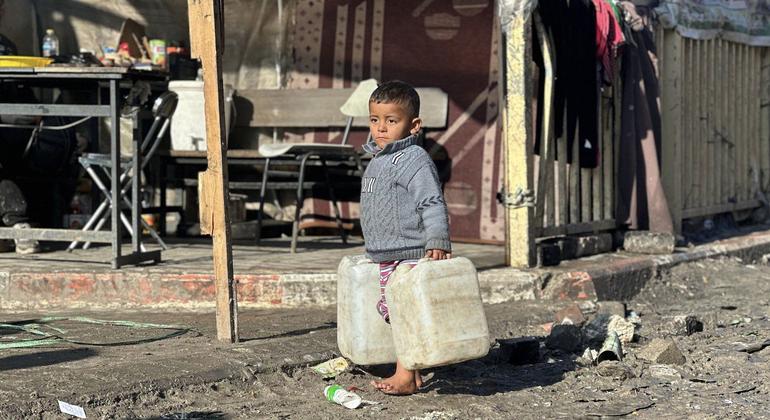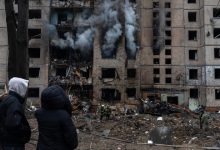UN Still Wrangling with Hurdles to Provide Aid in Gaza
 UN-coordinated food convoys are three times more likely to be denied access to north Gaza than other aid convoys, the UN humanitarian affairs office, OCHA, reported on Tuesday.
UN-coordinated food convoys are three times more likely to be denied access to north Gaza than other aid convoys, the UN humanitarian affairs office, OCHA, reported on Tuesday.
Israeli authorities have not given a clear reason why, said OCHA Spokesperson Jens Laerke, speaking during the regular briefing by UN humanitarian agencies in Geneva.
“They very often deny and that is it, and it ends there. We do not get an explanation,” he said.
In a widely reported telephone call last Thursday between United States President Joe Biden and Israeli Prime Minister Benjamin Netanyahu, Israel committed to reopen the Erez border crossing into northern Gaza as well as facilitate aid delivery via the nearby port of Ashdod.
The White House said it would be watching closely but no date has been set by Israel to act and the concession over expanding routes into Gaza has yet to materialize, according to news reports.
Mr. Laerke was asked about the opening of more aid corridors, particularly the Erez crossing, but said as of Monday night, OCHA had not received any information that it had opened.
Denials and impediments
OCHA issued a report this week which said that restrictions and denials of planned aid movements by Israeli authorities continue to hamper the delivery of life-saving assistance to the shattered enclave.
During March, more than half of UN-coordinated food missions to high-risk areas requiring coordination with Israeli authorities were either denied or impeded.
Mr. Laerke was responding to journalists’ questions about the number of aid trucks entering Gaza and discrepancies between Israeli and UN figures.
He said the Israeli Coordination of Government Activities in the Territories (COGAT) counts trucks that it screens and sends across the border while OCHA counts trucks that arrive at its warehouses, and “between those two, there are issues.”
Comparison ‘makes little sense’
Trucks screened by COGAT are typically only half full, in line with its requirements, he said.
“When we count the trucks on the other side when they have been reloaded…they are full. Already there, the numbers will never match up,” he continued.
He explained that counting day to day and comparing numbers “makes little sense” as it does not take into account delays at the crossing and in moving to warehouses.
Israeli-imposed restrictions also prohibit Egyptian drivers and trucks from being in the same area at the same time as Palestinian drivers and trucks, so handovers are not smooth.
Access to north Gaza
Mr. Laerke stressed that moving aid inside Gaza “is another complication”, referring to the impediments and access denials.
“Food convoys that should be going particularly to the north, where 70 per cent of people face famine conditions, are more likely, actually three times more likely, to be denied than any other humanitarian convoy with other kinds of material,” he said.
He told journalists that aid distribution inside Gaza “is a major issue” due to security and safety reasons, and the breakdown of law and order.
“But we also stress that the obligation on the warring parties – and, in particular, I would say on Israel as the occupying power of Gaza – to facilitate and ensure humanitarian access does not stop at the border,” he said.
Simon Blake is an experienced journalist deeply interested in international affairs and global development. Having spent years reporting on humanitarian issues, he offers a unique perspective in his coverage of United Nations news.




Why are UN-coordinated food convoys three times more likely to be denied access to north Gaza? Is there any official statement from the Israeli authorities explaining these actions?
It appears that the Israeli authorities haven’t provided a clear reason for the denial of access to north Gaza for UN-coordinated food convoys. Their tendency to deny without explanation is concerning and obstructs humanitarian efforts in the region.
It’s disheartening to see that aid convoys to north Gaza are facing such obstacles. The lack of clear explanations from Israeli authorities only adds to the frustration. Hopefully, the promises made will soon be translated into action to ensure that crucial aid reaches those in need without further delays.
OCHA’s report highlights the ongoing challenges faced by UN-coordinated aid convoys trying to reach north Gaza. It’s concerning that Israeli authorities are not providing clear reasons for denying access, hindering much-needed humanitarian assistance. Transparency and cooperation are crucial for improving aid delivery in the region.
It is concerning to hear that UN-coordinated food convoys face such obstacles in providing aid to Gaza. Israeli authorities need to provide transparent reasons for their denials to ensure efficient aid delivery.
It is deeply concerning that UN-coordinated food convoys are facing such hurdles in providing aid to north Gaza. The lack of clear explanations and delays in opening aid corridors only exacerbate the humanitarian situation in the region. Immediate action is needed to ensure timely and unobstructed aid delivery to those in need.
It is disappointing to see the ongoing hurdles faced by the UN in providing aid to Gaza. The denial of access to north Gaza for food convoys is unacceptable. We need transparency and cooperation for effective humanitarian efforts. Let’s hope for a swift resolution to these issues.
It’s truly disheartening to see that UN-coordinated aid convoys face such obstacles in providing assistance to those in need in north Gaza. The lack of transparency and explanations from Israeli authorities only exacerbates the situation. It’s crucial for humanitarian efforts to be allowed to proceed without unnecessary delays or denials.
Why are UN-coordinated food convoys to north Gaza more likely to be denied access compared to other aid convoys? Is there any specific reasoning provided for these denials?
Hi EmilyJohnson123, the UN-coordinated food convoys facing denials in north Gaza compared to other aid convoys could be due to the complex political situation in the region. Unfortunately, Israeli authorities often provide limited explanations for these denials, making it challenging to pinpoint specific reasons. Hopefully, with increased international pressure, we can see improvements in aid access to Gaza.
Why are UN-coordinated food convoys being denied access to north Gaza more often than other aid convoys? Is there any specific reasoning provided by Israeli authorities for these denials?
It’s concerning that UN-coordinated food convoys face more obstacles in reaching north Gaza. Israeli authorities need to be more transparent with their reasons for denying access, as this impacts the delivery of crucial aid.
It is deeply concerning that UN-coordinated food convoys are facing such barriers in providing aid to Gaza. The lack of clear reasons and explanations from Israeli authorities only exacerbates the situation, hindering the much-needed assistance to reach those in need. We hope for prompt resolution and unhindered access to deliver aid effectively.